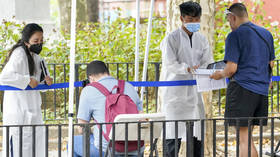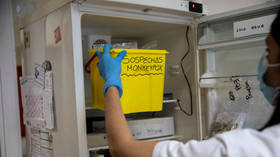New York declares monkeypox emergency

New York Governor Kathy Hochul declared a state of emergency on Friday amid the ongoing spread of monkeypox, vowing to take measures to stop the outbreak.
“I am declaring a State Disaster Emergency to strengthen our ongoing efforts to confront the monkeypox outbreak,” she tweeted.
The governor also issued an executive order, noting that New York “is now experiencing one of the highest rates of transmission” in the country.
“More than one in four monkeypox cases in this country are in New York, currently having a disproportionate impact on at-risk groups. We are working around the clock to secure more vaccines, expand testing capacity, and educate New Yorkers on how to stay safe,” Hochul said.
The executive order extends the pool of individuals who are allowed to administer vaccines. The new list includes EMS personnel, pharmacists, midwives, physicians, and certified nurse practitioners.
On Thursday, Hochul said she managed to secure an additional 110,000 monkeypox vaccine doses, bringing the total to 170,000. The extra doses are scheduled to be delivered over the next four to six weeks.
The declaration comes after similar steps were taken by the authorities in San Francisco, which announced a state of emergency over the monkeypox outbreak on Thursday.
As of July 29, the state of New York has recorded the most monkeypox cases in the country, with the Centers for Disease Control and Prevention (CDC) putting the number at 1,345. San Francisco estimated that there were 305 monkeypox cases in the city as of the same date.
Monkeypox is similar to human smallpox, which was eradicated in 1980, and is endemic in parts of West and Central Africa. Its initial symptoms include fever, headache, muscle aches, backache, swollen lymph nodes, chills, and exhaustion, and those afflicted develop distinctive skin lesions. According to the WHO, the current outbreak “is concentrated among men who have sex with men, especially those with multiple sexual partners,” because the disease is often transmitted through close skin-to-skin contact or contaminated materials such as bedding.














